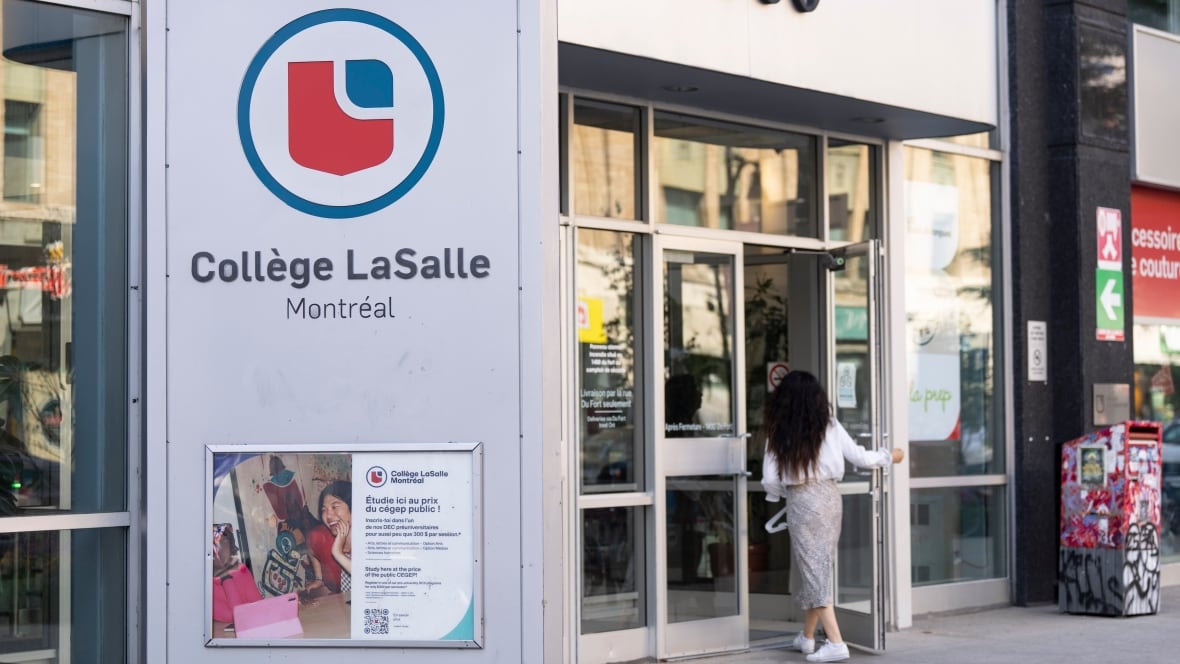Education
LaSalle College Faces Backlash as Students Shifted to Part-Time Status

Dozens of students at LaSalle College in Montreal have seen their educational plans upended as the institution shifts them from full-time to part-time status. This abrupt change comes less than a month before classes are set to begin in response to Quebec’s recent language reform, which aims to regulate English-language education.
Among those affected is Alex Abraham, 33, who was preparing to enter the second and final year of his network management program. He expressed shock at the news, stating, “We all came here with lots of expectations and dreams.” The alteration in status means that students like Abraham will not qualify for Canada’s post-graduation work permit, severely impacting their ability to work off-campus under current immigration rules.
Language Reform Triggers Student Unrest
LaSalle College announced that approximately 90 students would be affected by this change, which is limited to the upcoming fall semester. Caroline Gervais, a spokesperson for the college, explained that the adjustments were necessary to comply with the Charte de la langue française and government-imposed quotas on English-language vocational programs, specifically the Attestation d’études collégiales (AEC) diplomas.
The college is facing significant financial repercussions due to over-enrollment in its English-language programs. During the 2024-25 academic year, LaSalle exceeded its student quota by 1,066, incurring a fine of $21,113,864. This penalty followed an earlier fine of $8.7 million, bringing LaSalle’s total debt to the Quebec government to nearly $30 million. The institution is currently contesting these fines in a civil suit before Quebec’s Superior Court.
According to the lawsuit, about 70 percent of students enrolled in English-language AEC programs are international, like Abraham, who relocated from India. He noted that many students come to Quebec seeking better opportunities and are eager to integrate into the local culture while learning French.
Concerns Over Career Prospects and Financial Stability
Abraham had anticipated completing his IT program and securing a job to support himself. The sudden classification as a part-time student jeopardizes his employment prospects, as he stated, “How can I meet my expenses?” Without the ability to work off-campus, his financial situation has become precarious.
The college’s email informing students of their status change acknowledged that many of those affected had either failed classes or altered their academic pathways, though this did not apply to Abraham. He emphasized the randomness of his situation, stating, “I have the right to know the reason.” He is scheduled to meet with representatives from Immigration Canada and LaSalle College to seek answers regarding the change.
Gervais mentioned that factors outside of the college’s control, including student performance and scheduling, contributed to the necessity of the status changes. She clarified that the college did not exceed its overall AEC quota but was constrained by its available resources and the demands of the provincial regulations.
The provincial government, through a spokesperson for Higher Education Minister Pascale Déry, declined to comment on the situation, citing the ongoing legal proceedings. As students like Abraham grapple with the implications of these changes, the broader impact on LaSalle College’s reputation and financial stability remains to be seen.
Abraham’s plight shines a light on the challenges faced by international students navigating the complexities of the Quebec education system, leaving many to question the balance between compliance with government regulations and the well-being of students.
-

 Science1 week ago
Science1 week agoMicrosoft Confirms U.S. Law Overrules Canadian Data Sovereignty
-

 Technology1 week ago
Technology1 week agoGoogle Pixel 10 Pro Fold Specs Unveiled Ahead of Launch
-

 Technology1 week ago
Technology1 week agoWorld of Warcraft Players Buzz Over 19-Quest Bee Challenge
-

 Science5 days ago
Science5 days agoChina’s Wukong Spacesuit Sets New Standard for AI in Space
-

 Health6 days ago
Health6 days agoRideau LRT Station Closed Following Fatal Cardiac Incident
-

 Science1 week ago
Science1 week agoXi Labs Innovates with New AI Operating System Set for 2025 Launch
-

 Lifestyle6 days ago
Lifestyle6 days agoVancouver’s Mini Mini Market Showcases Young Creatives
-

 Science1 week ago
Science1 week agoInfrastructure Overhaul Drives AI Integration at JPMorgan Chase
-

 Technology1 week ago
Technology1 week agoHumanoid Robots Compete in Hilarious Debut Games in Beijing
-

 Top Stories1 week ago
Top Stories1 week agoSurrey Ends Horse Racing at Fraser Downs for Major Redevelopment
-

 Technology1 week ago
Technology1 week agoNew IDR01 Smart Ring Offers Advanced Sports Tracking for $169
-

 Health6 days ago
Health6 days agoB.C. Review Urges Changes in Rare-Disease Drug Funding System
-

 Technology5 days ago
Technology5 days agoDragon Ball: Sparking! Zero Launching on Switch and Switch 2 This November
-

 Business6 days ago
Business6 days agoCanadian Stock Index Rises Slightly Amid Mixed U.S. Markets
-

 Science1 week ago
Science1 week agoNew Precision Approach to Treating Depression Tailors Care to Patients
-

 Technology1 week ago
Technology1 week agoGlobal Launch of Ragnarok M: Classic Set for September 3, 2025
-

 Technology1 week ago
Technology1 week agoFuture Entertainment Launches DDoD with Gameplay Trailer Showcase
-

 Education5 days ago
Education5 days agoParents Demand a Voice in Winnipeg’s Curriculum Changes
-

 Technology1 week ago
Technology1 week agoInnovative 140W GaN Travel Adapter Combines Power and Convenience
-

 Business1 week ago
Business1 week agoNew Estimates Reveal ChatGPT-5 Energy Use Could Soar
-

 Health5 days ago
Health5 days agoRideau LRT Station Closed Following Fatal Cardiac Arrest Incident
-

 Business5 days ago
Business5 days agoAir Canada and Flight Attendants Resume Negotiations Amid Ongoing Strike
-

 Health1 week ago
Health1 week agoGiant Boba and Unique Treats Take Center Stage at Ottawa’s Newest Bubble Tea Shop
-

 Business1 week ago
Business1 week agoSimons Plans Toronto Expansion as Retail Sector Shows Resilience










